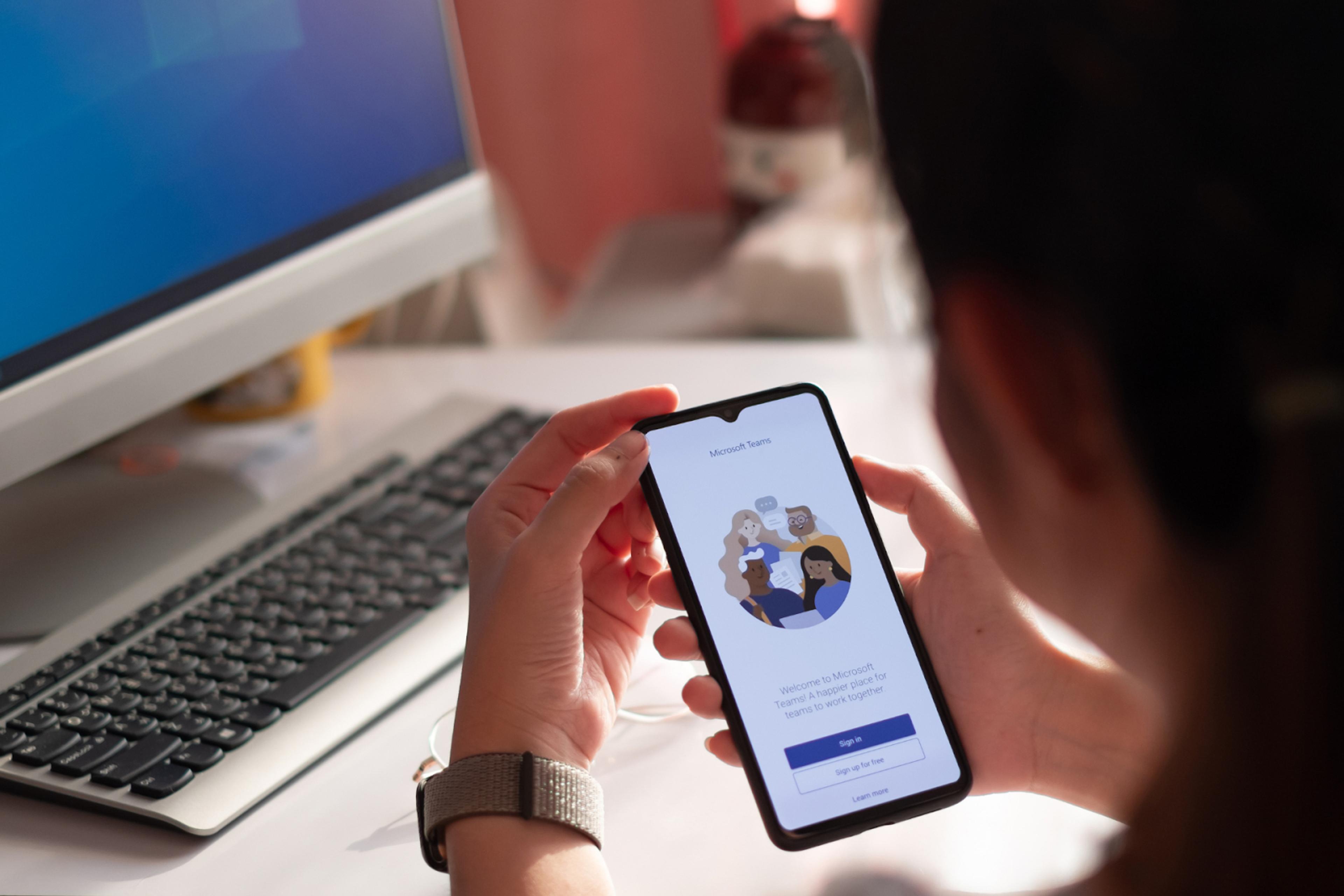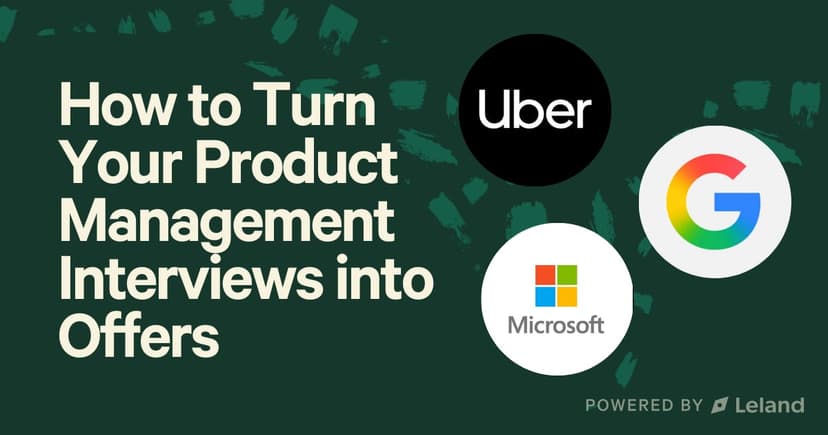Microsoft Product Manager Interview: Process, Questions, & Tips (2025)
Get ready for the Microsoft Product Manager interview with a clear guide on the process, common questions, and practical tips to help you succeed in 2025.
Posted September 10, 2025

Join a free event
Learn from top coaches and industry experts in live, interactive sessions you can join for free.
Table of Contents
Landing a Microsoft Product Manager role is a significant career milestone, and the interview process is designed to assess your skills, experience, and fit within the company. In this article, we will walk you through its interview process, cover the types of questions you can expect, and share practical tips to help you succeed. Whether you're new to product management or bringing experience from other tech companies, this will help you prepare confidently for the interview.
Read: What is Product Management?
Understanding the Microsoft PM Role
Before jumping into the interview prep, take a moment to understand what the Microsoft Product Manager role really entails. Be familiar with their roles and what they do.
What Do Product Managers Do at Microsoft?
- Product Vision: You will help shape the direction of Microsoft products, focus on user needs, and business goals.
- Product Roadmap: You’ll be responsible for planning the product strategy and managing the timeline for the development of features.
- Collaboration: A big part of this role involves working with different teams, from designers to engineers, and bringing new features to life.
- Customer Focus: Understanding customer pain points and solving problems is a major part of the job. Your job is to make products that solve real user problems.
Read: How to Prepare for Your Product Management Interview
Microsoft PM Interview Process: A Step-by-Step Guide
Stage 1: Initial Screening
The process typically begins with an initial phone screen with a recruiter. During this conversation, you’ll discuss your background, your interest in the product management role at Microsoft, and your understanding of the Microsoft product manager position. The recruiter will ask you a series of questions to better understand how your skills and experience align with the role. This is often focused on communication skills and whether you’re a good fit for the position.
Stage 2: Phone Interview
If you pass the initial screening, you will proceed to the phone interview. At this stage, the conversation will dive deeper into your past experiences. Expect a mix of behavioral questions and technical questions.
Behavioral questions will assess how you handle situations and how you approach challenges in product management. This helps the interviewers understand your skills and your ability to collaborate effectively. On the other hand, technical questions, while not requiring deep expertise in computer science, will focus on your understanding of how to work with technical teams. You might be asked to describe your approach to solving customer points or to prioritize features for a Microsoft product such as Microsoft Office.
Stage 3: Onsite Interview
This is a more intense part of the Microsoft interview process. During this phase, you’ll face a combination of behavioral and product sense interviews. The goal is to assess both your strategy and how you think about product decisions.
In the product sense interview, you’ll be asked about how you would approach product development and strategy. This tests your ability to prioritize features and solve complex product challenges. The interviewers will be looking for your product vision and your ability to think critically about product decisions.
Stage 4: Final Interview
The final interview often involves meeting with the hiring manager and possibly senior PMs or senior leadership. This stage is focused on your strategic thinking, long-term vision for a Microsoft product, and your ability to work with future PM peers. Interviewers will want to see how well you understand Microsoft's product strategy and how you can contribute to the company’s goals. This is your chance to demonstrate your understanding and your ability to drive product growth.
Note: Each stage of the process builds on the previous one, so be prepared for different types of questions that evaluate your technical knowledge, communication skills, and how well you align with the company’s values.
Read: Microsoft Product Manager: Interview Process, Salary, & Responsibilities
Interview Questions to Prepare For
You’ll face a variety of questions that assess both your technical abilities and your leadership potential as a Microsoft PM. Below are sample questions and answers for each category:
Behavioral Questions
Sample Question: "Tell me about a time you had to solve a customer problem."
Sample Answer: "In a previous role, I worked on a feature for Microsoft Office. Users reported issues with syncing documents across devices. I worked closely with the engineering team to identify the issue and rolled out an update that improved syncing reliability.
Sample Question: "Give an example of a product decision you made and how you approached it."
Sample Answer: "During the development of our new product, I had to decide between two feature options. I decided to gather data from our customers and market analysis to prioritize the feature that would deliver the most value to users."
Product Management Questions
Sample Question: "What’s your approach to creating a product roadmap?"
Sample Answer: "I will start by understanding the customer pain points and aligning those with business goals. Then I'll work with technical teams to determine what’s feasible and prioritize features that will have the most impact on both users and the business."
Sample Question: "How do you prioritize customer feedback in product development?"
Sample Answer: "It is by categorizing it into themes. Then, I work with teams to validate those needs with market data. Features that align with both customer needs and business objectives are given priority in the product roadmap."
Technical Questions
Sample Question: "How would you work with machine learning teams to improve a product?"
Sample Answer: "I would work with the machine learning teams to identify opportunities for AI-driven features that solve customer pain points. For example, we could integrate machine learning to improve predictive text in Microsoft Office, helping users be more productive."
Sample Question: "Explain a time when you had to make a technical trade-off."
Sample Answer: "In a previous project, we had to choose between adding a new Microsoft Teams feature or improving an existing one. After weighing the technical complexity and user needs, we just decided to enhance the current feature, which improved overall user satisfaction with minimal additional resources."
Strategy and Vision Questions
Sample Question: "What’s your vision for our Microsoft product in the next 5 years?"
Sample Answer: "My vision is to create a Microsoft product that evolves alongside our users' needs. For example, with Microsoft Teams, I see it becoming the central hub for all workplace communication, integrating with more tools to enhance productivity and collaboration."
Sample Question: "How do you think about market analysis when launching a new product?"
Sample Answer: "When launching a new product, I first conduct thorough market analysis to understand potential gaps in the market. This helps in shaping the product vision and ensures we’re addressing real customer pain points while also differentiating from competitors."
Common Mistakes to Avoid in a Microsoft PM Interview
1. Generic Answers
Avoid giving generic responses. Be specific about how your past experiences align with the role. When asked about handling difficult situations, provide a detailed example from your experience.
2. Lack of Technical Understanding
Even if you don’t have a computer science background, make sure you understand basic technical concepts. Be ready to discuss how you work with technical teams.
3. Overemphasizing Soft Skills
While communication skills and leadership are important, don’t ignore the technical and strategic parts of the role. Balance them both.
How to Stand Out During the Microsoft PM Interview
1. Show Passion for Microsoft’s Mission
Demonstrate that you’re aligned with Microsoft’s mission and values. Discuss how your skills can contribute to their long-term product strategy.
2. Highlight Problem-Solving Skills
Microsoft values these skills. Be prepared to talk through how you approach complex issues, whether it’s solving customer concerns or making tough product decisions.
3. Be Ready for the Final Round
This is your chance to show why you’re the right fit. Be prepared to discuss your vision for a Microsoft product and how you can contribute to their product.
Read: The Secret to Excelling in Product Management Interviews
5 Expert Tips and Preparation Strategies for the Microsoft PM Interview
1. Know Microsoft’s Products
Study Microsoft’s products like Microsoft Teams, Microsoft Office, and other tools. Understand the target audience, business goals, and the competitive landscape. This knowledge will help you answer product strategy questions more effectively.
2. Practice Mock Interviews
Mock interviews are one of the best ways to prepare. Practice with friends, mentors, or even online platforms. Focus on answering behavioral and product questions concisely.
3. Review Your Past Experiences
Think about your past projects where you worked on product management. How did you solve problems? How did you prioritize tasks? Be prepared to talk about your past experiences and how they relate to Microsoft’s mission.
4. Brush Up on Technical Concepts
Even if you’re not expected to code, understand key technical knowledge related to product management. Know how product teams work and how technical constraints can affect product decisions.
5. Prepare for Strategy Questions
Microsoft wants to know how you think about product strategy. Be prepared to answer questions about how you would approach market analysis, product vision, and planning a product’s future.
Read: Product Strategy: What it Is and How to Build One
The Bottom Line
Preparing for the Microsoft Product Manager interview involves understanding the role’s responsibilities and the production process, as well as studying the interview stages and questions focused on problem-solving skills, product strategy, and collaboration. Microsoft expects candidates to showcase their ability to align with their mission and present a strategic vision. Experienced PM interviewers will look for specific examples from previous interviews, so it’s important to be ready to discuss how you’ve approached challenges in past roles. By connecting your background to the job description and avoiding generic answers, you’ll stand out as a strong candidate. With preparation and confidence, you can impress Microsoft’s hiring managers and demonstrate why you’re the ideal fit for the role.
Ready to Succeed in Your Microsoft PM Interview?
Boost your chances of acing the interview with personalized guidance from expert coaches who can help you craft your responses and refine your approach. Get ready to stand out and secure your spot at Microsoft with tailored coaching and comprehensive interview prep!
Be prepared and read these next:
- How to Prepare for Square Product Management Behavioral Interviews
- How to Prepare for TikTok Product Management Case Interviews
- How to Prepare for Uber Product Management Case Interviews
- How to Prepare for Yahoo Product Sense Interviews
- How to Write a Powerful Product Management Cover Letter
- Product Manager Case Study Interviews: What to Expect, Questions, & Examples
- The Different Types of Product Management: An Overview of Specialist PM Jobs
FAQs
How to prepare for a Microsoft Product Manager interview?
- Study Microsoft’s products, practice behavioral and technical questions, and focus on problem-solving and product strategy. Mock interviews with feedback can also help refine your approach.
How hard is it to get a PM job at Microsoft?
- It’s competitive. They expect strong problem-solving, leadership, and technical skills, and the interview process is rigorous compared to other hiring managers in top tech companies.
How much does Microsoft pay for a Product Manager?
- PM salaries at Microsoft range from $120,000 to $180,000, with bonuses and stock options based on experience and seniority.
How should I prepare for a Product Manager interview?
- Review the job description, practice behavioral and technical questions, and focus on problem-solving and product strategy. Mock interviews can also be helpful for feedback.
Browse hundreds of expert coaches
Leland coaches have helped thousands of people achieve their goals. A dedicated mentor can make all the difference.



























